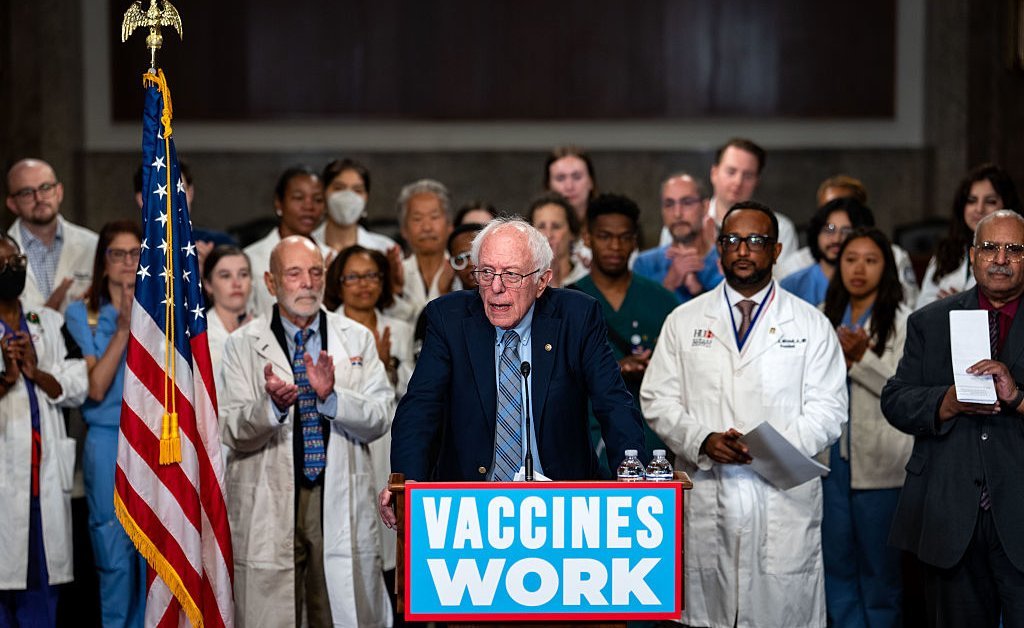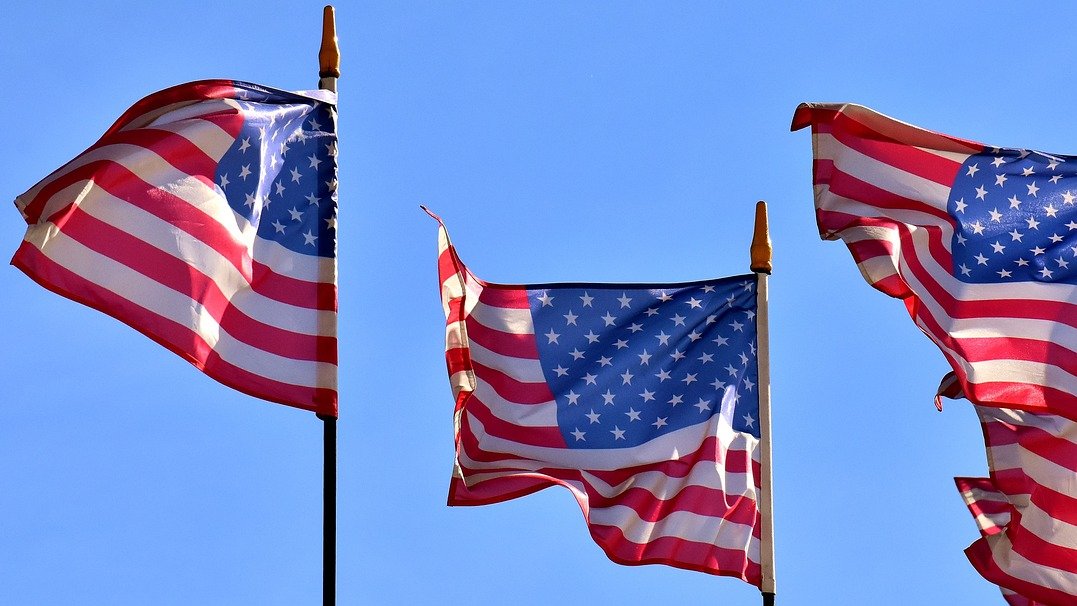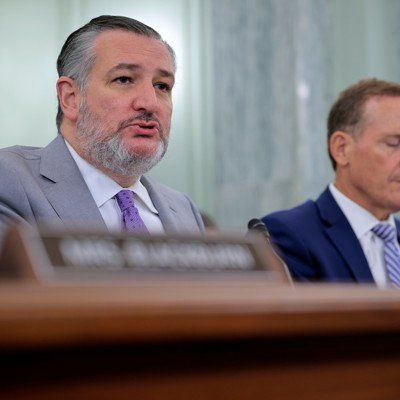This article is part of The D.C. Brief, TIME’s politics newsletter. Sign up here to get stories like this sent to your inbox.
The nation’s top health officials, regulators, and policy wonks huddled on the eighth floor of the Department of Health and Human Services on Tuesday to take a victory lap for a new report on children’s health that was big on hype—128 ideas!—but slim on actual prescriptions.
At a separate event called by Sen. Bernie Sanders, the democratic socialist from Vermont, there was railing about the massive hypocrisy coming out of the Trump administration when it comes to health priorities.
Both fit the pattern of Washington right now: lots of noise around following the real science, but where that science leads depends on who is the tutor. Sanders had leading medical figures standing with him. But HHS Secretary Robert F. Kennedy Jr. is running the largest health operation in the world.
At the unveiling of a report by Kennedy’s Make America Health Again Commission, the dog whistles were more like foghorns.
Kennedy’s report raises questions about when children should get what vaccines when and whether fluoride in drinking water is at safe levels—two areas where leading experts have said he is spreading misinformation. A new National Institutes of Health center to study childhood chronic disease was also proposed, on top of wanting more information on the patterns behind how kids were prescribed anti-depressants and medicines to treat ADHD. The report also wants a closer look at the effects of electromagnetic radiation, the microbiome, and the root causes of autism. Oh, and the reports’ authors want a public-education campaign aimed at improving fertility. (Yes, that made its way into a report about children’s health.)
More broadly, the report criticizes ultra-processed foods, chemical over-exposure, and overmedication. Kennedy called for more studies into vaccine injuries, which he argued are far under-reported, and the over-prescription of drugs. But the recommendations stopped short of a ban on pesticides and processed foods for kids, which had some industry insiders on K Street thinking they had dodged one of their biggest fears of the Secretary’s crusade.
In short: it’s a list of goals but not real concrete steps to achieve any of them. The vagueness may be the point to give Kennedy cover from his growing camp of critics while letting the MAHA folks think they’re getting their wish list. It may be too cute by half.
“There’s never been an effort like this across all the government agencies,” Kennedy boasted as other Cabinet and top administration officials surrounded the made-for-TV debrief.

Hours earlier, Sanders was bashing Kennedy and Republicans for their skepticism about vaccines, hostility to expertise, and purge of medical talent—including top hands at the Centers for Disease Control and Prevention and the Food and Drug Administration.
“At this unprecedented moment in American history, it is important to share the facts as clearly as we can,” Sanders said, flanked by representatives from major medical associations that count more than 100,000 professionals as members. “Vaccines work. Period.”
The United States, Sanders said, is “witnessing a full-blown war on science, on public health and on truth itself.”
The dueling events in Washington on Tuesday illustrated just how Kennedy’s typically grunt role as the nation’s health secretary has roiled Washington, ignited a public discussion about normally administrative backwaters, and scrambled the public’s view of what the federal government should and shouldn’t be doing around the country’s biggest health challenges.
“We are now the sickest country in the world,” Kennedy said, sliding back into one of his familiar talking points. Yet it was hard to take Kennedy’s prescriptions at face value amid the glaring contradictions. While he called for improving the quality of food available to Americans, the Trump spending regime has cut support for poor families to reach it. “Nutrition drives disease,” Kennedy’s deputy, Jim O’Neill, said. The report seeks better data on environmental factors, while in practice the Trump team slashed money for those numbers. At one point, Kennedy dodged a question on gun violence by turning to the conservative talking point that the problem is not firearms but rather mental health and maybe even video games.
The MAHA takeover in Washington is having noticeable ripple effects. The sloganeering has cajoled some of the nation’s biggest food brands to shift its offerings, curb the use of some dyes, and even redo recipes of iconic goods like Coca-Cola and day-to-day items like baby formula. Yet the moves have mostly been symbolic and voluntary. For small-government evangelists sitting in the conference room up on the HHS penthouse level, there was a whole lot of talk about reaching into private companies and family fridges to shape options for consumers. But it was precisely this strain of easy fixes that helped Donald Trump win the presidency a second time.
Tuesday’s report included platitudes about making school meals healthier and to limit accessibility to junk food in food stamp programs. Days after Florida announced plans to become the first state to make school vaccinations voluntary, Kennedy called for a revision to childhood vaccine schedules and for new research about chronic diseases. The report also carried praise for whole milk over skim.
The report largely tracks with what Kennedy and his allies in the White House have been pushing from the start. In reading from their scripts, the officials returned to a familiar pattern of heaping praise on Trump, who later in the day signed an order putting limits on how drugmakers advertise their products. It was like watching a Cabinet meeting that Trump skipped.
His MAHA Commission repeatedly said it was rebuilding the food pyramid to limit processed foods and emphasize home-grown whole foods. (The FDA Commission on Tuesday called the widely-seen pyramid a huge source of “misinformation.”) In other matters, Kennedy’s team diagnosed corporate interests and prescription medications as causes to sick, stressed, and screen-fixated kids. But the culture wars always find a way to creep in. The discussion touched on ADHD, autism, psychiatric drugs, video games, and social media. The clang of a political gong is deafening.
Childhood health, on its face, should not be a politically divisive subject. But here we are, when political needs supplant decades of medical science. Where piles of research point to one conclusion, the MAGA and MAHA bases—and they are often at different aims—demand something else that feeds their gut. And leading medical experts find themselves having to stand with a Senator from Vermont instead of the top government official in their field. Over the course of a few hours in Washington on Tuesday, the increasingly muddled state of public health unfolded.
Make sense of what matters in Washington. Sign up for the D.C. Brief newsletter.




